The Nine Lives of John F. Kennedy
Taking a look at some of Kennedy’s most memorable comic book deaths.
If you were alive on November 22, 1963, you know exactly where you were when you heard the news that President John F. Kennedy was assassinated in Dallas, Texas. The death of one of the most popular Presidents of the 20th century is a tragic event that continues to be immortalized in various forms of media for not only its historical context, but the air of mystery and storytelling opportunities it provided for writers.
Comic books are of course, no different; John F. Kennedy’s assassination has been retold countless times. Let’s take a look at nine varying comic book versions of the JFK assassination, ranked in no particular order, with one bonus cameo appearance. As always, be warned that there will be spoilers as you read on.
9 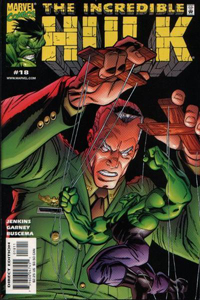 Incredible Hulk vol. 3 #18
Incredible Hulk vol. 3 #18
First on our list is a relatively lower key version of the assassination. Bruce Banner is digging up dirt on the villainous General John Ryker, and is presented with a photograph that depicts Ryker, disguised as a police officer, arresting civilians after the assassination. It is important to note that whether Ryker himself was the shooter in this version of events, or was simply in cahoots with the arrested lone gunman, Lee Harvey Oswald, is not explicitly stated. But a Hulk villain being involved in either a conspiracy or a cover-up is just one story from the 616 universe.
8 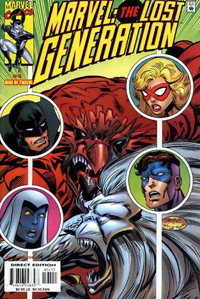 Marvel: The Lost Generation #4
Marvel: The Lost Generation #4
In a unique book that explores the post-World War II, pre-dawn of the Marvel superhero universe, The Lost Generation touched on many keystone events that helped shape the world that the imprint’s modern heroes inhabit. In one issue, First Line founding member and psychic empathy Nightingale warns against something bad happening in Dallas in late November. When the members of the First Line head to Dallas to prevent the unthinkable from occurring, they clash with villains and believe that the perceived danger has been avoided, leaving Dallas on November 21, 1963, merely a single day before John F. Kennedy was assassinated.
7 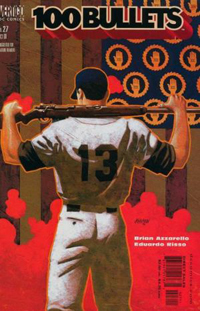 100 Bullets #27
100 Bullets #27
In a turn of events wildly different than any other on this list, 100 Bullets attributes the assassination of JFK to baseball legend Joe Dimaggio, who is acting out of revenge for the death of Marilyn Monroe. The enigmatic Agent Graves offers the Yankees center fielder a briefcase containing evidence which confirms Kennedy’s responsibility for Monroe’s death, along with a handgun with the eponymous 100 bullets.
6 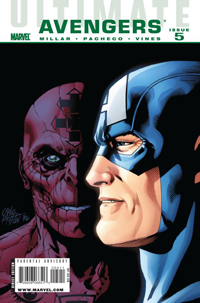 Ultimate Avengers #5
Ultimate Avengers #5
With Marvel’s new Ultimate Universe came slightly retooled origin stories and grittier, modernized characters and consequences. As told by Nick Fury, the new origin story for the Red Skull, Captain America’s arch-nemesis, features a villain who takes no prisoners. In just a single issue, the Red Skull forces a wife to brutally murder her husband, holds an infant hostage before committing infanticide, orders two soldiers to cannibalize each other, and, of course, assassinates John F. Kennedy. It’s a very curious case when the assassination of a President is the least violent thing in an issue, but the stakes had to be raised in order to bulk up the Red Skull into a villain worthy of the entire Ultimates team.
5 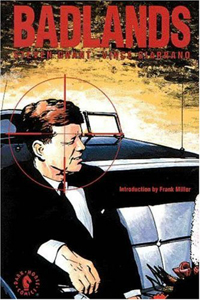 Badlands
Badlands
Steve Grant’s miniseries Badlands, is an interesting outlier on the list in that the central plot of the series revolves around the assassination itself. The protagonist, Conrad “Connie” Bremen believes he is being manipulated into shooting John F. Kennedy. As the series continues, Bremen realizes he was supposed to be in Lee Harvey Oswald’s place, murdered and being remembered by history as the lone gunman who took down JFK. The miniseries explores the conspiracy concept very interestingly, tying in Oswald’s murderer, Jack Ruby, while many other versions leave Ruby in the dust.
4 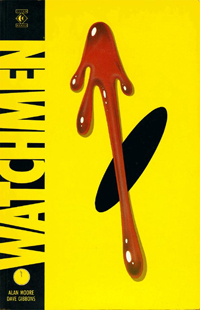 Watchmen
Watchmen
You can’t discuss the crossroads of Cold War-era political happenings and comic books without the inevitable conclusion: Watchmen. In the original comic, the Comedian jokingly suggests that he had a hand in assassinating John F. Kennedy, as he was in Dallas on the day of the shooting while operating as a bodyguard for Richard Nixon. In Zach Snyder’s 2008 cinematic adaptation of the story, this throwaway line is expanded and Eddie Blake is shown taking down the President during the opening credits sequence, tastefully set to The Times They Are a Changing by Bob Dylan.
3 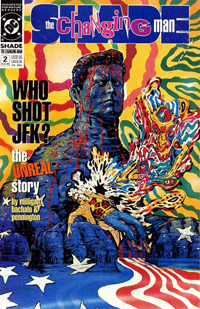 Shade, the Changing Man #2
Shade, the Changing Man #2
As one of the lead titles in DC Comics’ Vertigo imprint, Shade, the Changing Man explored issues considered too adult for mainstream comics. Peter Milligan explores the thematic effects of Kennedy’s assassination, and opts to focus on the fallout from the tragedy rather than the actual events that conspired. Milligan’s writing is on point, emphasizing that no matter who pulled the trigger, it was America at large who put Kennedy up on a pedestal and one way or another, everything comes down to somebody hoping to turn a profit.
2 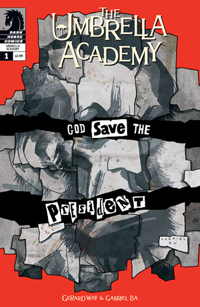 The Umbrella Academy: Dallas
The Umbrella Academy: Dallas
In the second volume of ‘better than it sounds’, surprisingly fun, always tongue-in-cheek science fiction superhero series from My Chemical Romance’s Gerard Way, the spotlight shifts to The Boy, number five in the titular Umbrella Academy. As the Boy’s dark past comes to light, he and his siblings travel to November 22, 1963 in order to stop an older version of The Boy from failing to assassinate John F. Kennedy. If you’re already confused, don’t worry, story begs to be read multiple times. While Badlands worked Jack Ruby into their version of events, The Umbrella Academy instead opts to work in Jackie Kennedy, with great success.
1 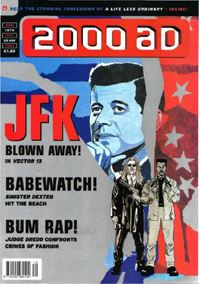 2000AD #1070
2000AD #1070
In an installment of the series Vector 13, the time traveling assassins Sinister and Dexter are responsible for killing JFK. Originally published in prog #1070 of the long running British serial 2000 AD, the story was typical of the humorous science fiction conspiracy theories of the time, connecting aliens to important political deaths and events. Despite the story being mostly forgettable and in fact summed up perfectly by its cover tagline – ‘JFK Blown Away! in Vector 13’, it earns a place on the list for having John F. Kennedy get killed off by analogues of Vincent Vega and Jules Winnfield from Pulp Fiction.
0 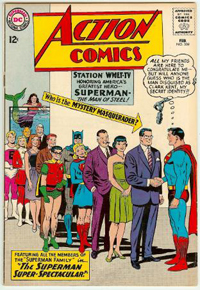 Action Comics #309
Action Comics #309
Time for the bonus round! In one of those freak coincidences you have to see to believe, Action Comics #309, which ominously featured Superman meeting John F. Kennedy, hit shelves the week after the assassination. The story is more than a little contrived, as JFK poses as Clark Kent in order to aid Superman in protecting his secret identity. Of course, the President survives the issue unscathed, armed only with the knowledge that Superman is, in fact, Clark Kent.
There you have it, folks. Nine differing takes on the death of John F. Kennedy, and one fun oddity from the 1960’s. New comic books will come and go, returning time and time again to the events of November 22, 1963, but let us not understate the immense tragedy of that day. Rest in peace, sir.
